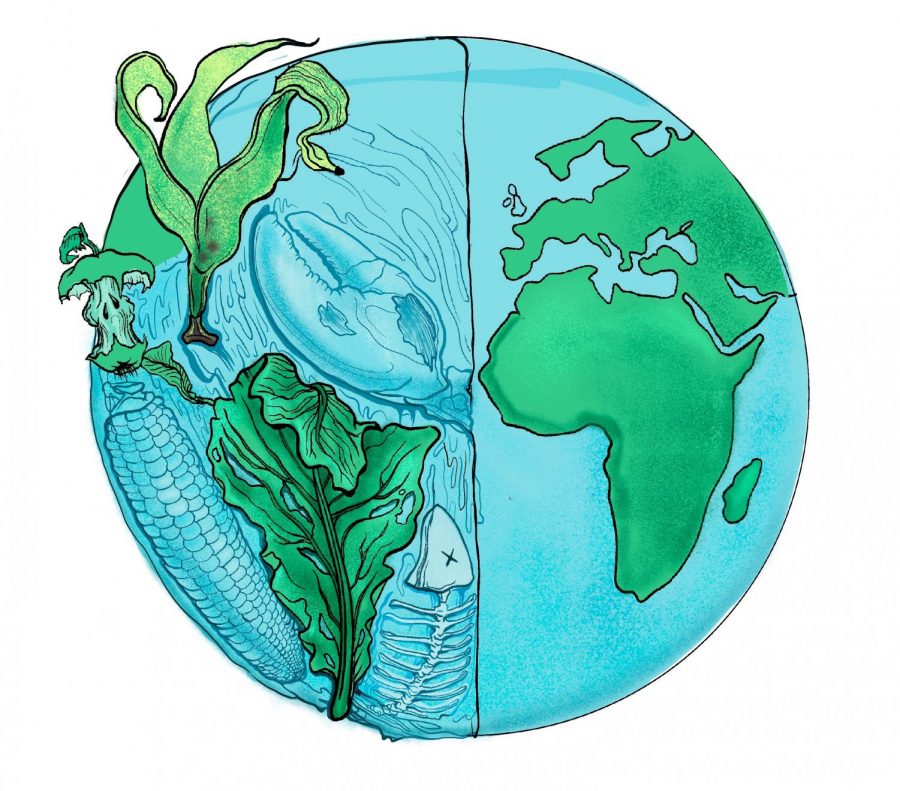Global Reset: Food waste contributes to climate change
Green Team hosts EcoChallenge for Earth Day, encourages school members to complete environmentally conscious tasks
In honor of Earth Day on April 22, Green Team hosted the multi-day long Harker EcoChallenge. Students and faculty members completed environmentally responsible tasks, like consuming meatless meals or travelling by bike, and submitted their accomplishments for points.
May 19, 2021
Every year, $936 billion worth of food is wasted, according to the Food and Agriculture Organization of the United Nations (FAO). These 1.3 billion tonnes, equivalent to one third of all food produced, can be used to feed over two billion people. However, the uneven distribution of resources across the world means the lost waste ends up in landfills, instead of going to the impoverished and malnourished.
Furthermore, the agricultural sector and food production have severely harmful effects on the environment and climate change. Global food loss accounts for 8% of all greenhouse gas emissions, and the emissions cost up to $411 billion annually. In North America, each person releases 860 kilograms (kg) of carbon dioxide gas (CO2) into the atmosphere every year; in Asia, each person releases 810 kg; in Europe, 680 kg; and in Latin America, 540 kg.
Food can be wasted at a variety of stages within the production process, which includes agricultural production, handling, storage, processing, distribution and finally, consumption. However, the meat industry, though not as large as other sectors, may contribute the most to climate change. Animals, like cows, produce the greenhouse gas methane, and the use of fertilizer in their food and manure management can also harm the environment.
“One of the things the government can do is, we subsidize farmers for producing corn. And as a result of that, we grow more corn than we need, and a lot of that corn goes to feeding cows. And the production of beef is one of the more harmful products that we produce, so if we can ask our government to stop subsidizing corn but rather start subsidizing the healthy vegetables,” Diana Moss, upper school Spanish teacher and Green Team adviser said.
The United Nations aims to cut back on food waste by one half by 2030, and although world governments have a large responsibility in this issue, there is still much that individuals can do. As our community celebrated Earth Day this past week, we should recognize that our own decisions can help or harm our planet as well.
“It’s much better to consume as much as you can and not overbuy and waste the food because other people might profit off of the food more than you can if you wasted it. So just be conscious of the food you consume and what you purchase,” Paulina Gicqueau (10), a Green Team member said. “Especially when you go back on campus, grab as much as you need and not more; take everything in moderation.”
Some food waste is inevitable, but the scraps can be turned into compost for soil. Moss recommends that families set up a composting system at home.
“If you do toss your food, consider composting. I would love to see a student-led initiative to see if we can get a sort of composting system at Harker, because that food waste could be turned into soil and enrich the soil,” Moss said.
Other solutions include eating more sustainable foods, buying locally grown produce, saving leftovers and avoiding putting harmful substances into the soil.



















![“[Building nerf blasters] became this outlet of creativity for me that hasn't been matched by anything else. The process [of] making a build complete to your desire is such a painstakingly difficult process, but I've had to learn from [the skills needed from] soldering to proper painting. There's so many different options for everything, if you think about it, it exists. The best part is [that] if it doesn't exist, you can build it yourself," Ishaan Parate said.](https://harkeraquila.com/wp-content/uploads/2022/08/DSC_8149-900x604.jpg)




![“When I came into high school, I was ready to be a follower. But DECA was a game changer for me. It helped me overcome my fear of public speaking, and it's played such a major role in who I've become today. To be able to successfully lead a chapter of 150 students, an officer team and be one of the upperclassmen I once really admired is something I'm [really] proud of,” Anvitha Tummala ('21) said.](https://harkeraquila.com/wp-content/uploads/2021/07/Screen-Shot-2021-07-25-at-9.50.05-AM-900x594.png)







![“I think getting up in the morning and having a sense of purpose [is exciting]. I think without a certain amount of drive, life is kind of obsolete and mundane, and I think having that every single day is what makes each day unique and kind of makes life exciting,” Neymika Jain (12) said.](https://harkeraquila.com/wp-content/uploads/2017/06/Screen-Shot-2017-06-03-at-4.54.16-PM.png)








![“My slogan is ‘slow feet, don’t eat, and I’m hungry.’ You need to run fast to get where you are–you aren't going to get those championships if you aren't fast,” Angel Cervantes (12) said. “I want to do well in school on my tests and in track and win championships for my team. I live by that, [and] I can do that anywhere: in the classroom or on the field.”](https://harkeraquila.com/wp-content/uploads/2018/06/DSC5146-900x601.jpg)
![“[Volleyball has] taught me how to fall correctly, and another thing it taught is that you don’t have to be the best at something to be good at it. If you just hit the ball in a smart way, then it still scores points and you’re good at it. You could be a background player and still make a much bigger impact on the team than you would think,” Anya Gert (’20) said.](https://harkeraquila.com/wp-content/uploads/2020/06/AnnaGert_JinTuan_HoHPhotoEdited-600x900.jpeg)

![“I'm not nearly there yet, but [my confidence has] definitely been getting better since I was pretty shy and timid coming into Harker my freshman year. I know that there's a lot of people that are really confident in what they do, and I really admire them. Everyone's so driven and that has really pushed me to kind of try to find my own place in high school and be more confident,” Alyssa Huang (’20) said.](https://harkeraquila.com/wp-content/uploads/2020/06/AlyssaHuang_EmilyChen_HoHPhoto-900x749.jpeg)













